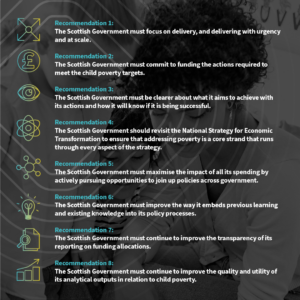The Poverty and Inequality Commission says Scottish Government’s progress in tackling child poverty needs to scale up, speed up and requires significant investment
Following today’s Ministerial Statement on Tackling Child Poverty Delivery Plan – Fifth Year Progress Report (2022-23), the Poverty and Inequality Commission (PIC) today releases its latest scrutiny report titled, ‘Child Poverty Delivery Plan progress 2022-2023: Scrutiny by the Poverty and Inequality Commission’.
The report finds that while increasing the Scottish Child Payment to £25 per week undoubtedly represents significant progress in tackling child poverty, more action is required at a greater scale or Scotland will miss the 2030 child poverty targets.
In preparing the annual Child Poverty Progress Report, Scottish Ministers must consult the Poverty and Inequality Commission on the progress that is being made towards meeting the child poverty targets.
The Commission has worked with members of its Experts by Experience Panel to look in detail at what progress has been made in implementing some of the major commitments in the Scottish Government’s second child poverty delivery plan, Best Start, Bright Futures.
Bill Scott, chair of the Poverty and Inequality Commission commented:
“The increase in the Scottish Child Payment to £25 per week and its roll out to eligible under-16s during 2022-23 is making a real difference to the lives of children and families across Scotland, but it won’t be enough to meet the 2030 child poverty targets alone.
“The Scottish Government must commit to funding the actions required to meet the child poverty targets and it will need to reprioritise spend and use its devolved tax powers to raise additional revenue.
“The current financial situation is challenging and the funding being allocated to tackle child poverty does not seem to match the ambitions the Scottish Government set out in Best Start, Bright Futures. This is likely to be one reason for the lack of pace of delivery. A planned increase to employability funding was delayed, and limited funding has been allocated so far to deliver childcare commitments.
“In ‘Best Start, Bright Futures’ the Scottish Government committed to increasing investment in employability support; developing a funded offer for early learning and childcare for one- and two-year-olds, starting with low income households; and building a system of school age childcare, with those on the lowest incomes paying nothing. These could all make a big difference to addressing child poverty. But there has not been enough progress on delivering these actions.
“Our message could not be clearer. We need to see greater investment being made to key areas which can have the greatest impact and we need to see that happen now, before it’s too late to meet the targets.”
Experts by Experience Panel member Hussein Patwa who contributed to the report, said:
“As part of a panel with first-hand experience of poverty it was good to have the chance to learn from these meetings, share our input, ask questions and be part of the scrutiny process, and to better understand the results of the work we have engaged in over the last few months.
I was particularly keen to hear about the data used to make decisions, how it was collected, interpreted, and how this feeds into future actions. I was pleased to note the impact of the uprated Scottish Child Payment and that some progress is being made towards meeting the 2030 targets, however it was clear at this point that the likelihood of achieving the desired outcomes in the stated timeframe is low.”
Experts by Experience Panel member Zahada Safdar who contributed to the report, said:
“The Scottish Child Payment is only one of the many elements in meeting child poverty targets. Clarity, clear direction and focus is now urgently required, in the form of getting single parents into well paid secure jobs, retraining, getting disabled people in work and adequate benefits for those unable to.
Along with affordable childcare and adequate affordable housing making up the many pieces of this puzzle; The Scottish Government need to get it right to meet the 2030 Child Poverty Targets.”
The Commission makes the following recommendations that the Scottish Government must:
1. focus on delivery and delivering with urgency and at scale
2. commit to funding the actions required to meet the child poverty targets
3. be clearer about what it aims to achieve with its actions and how it will know if it is being successful
4. revisit the National Strategy for Economic Transformation to ensure that addressing poverty is a core strand that runs through every aspect of the strategy
5. maximise the impact of all its spending by actively pursuing opportunities to join up policies across government
6. improve the way it embeds previous learning and existing knowledge into its policy processes
7. continue to improve the transparency of its reporting on funding allocations
8. continue to improve the quality and utility of its analytical outputs in relation to child poverty
